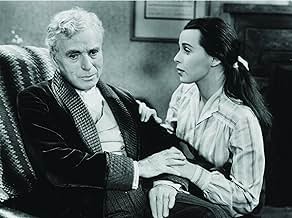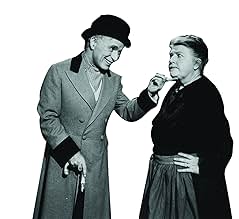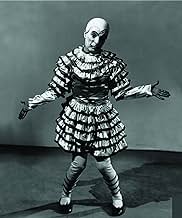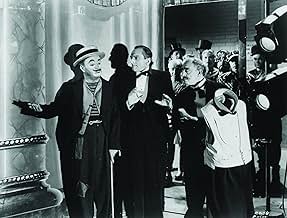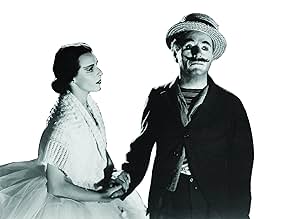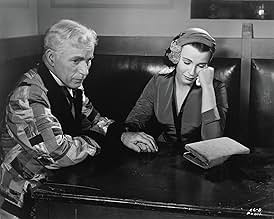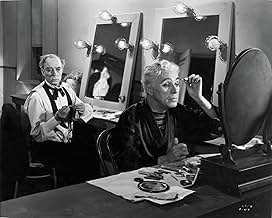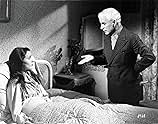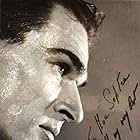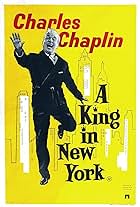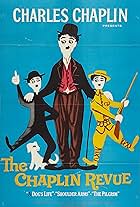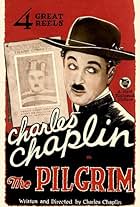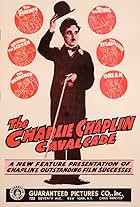A fading comedian and a suicidally despondent ballet dancer must look to each other to find purpose and hope in their lives.A fading comedian and a suicidally despondent ballet dancer must look to each other to find purpose and hope in their lives.A fading comedian and a suicidally despondent ballet dancer must look to each other to find purpose and hope in their lives.
- Won 1 Oscar
- 7 wins & 4 nominations total
Molly Glessing
- Maid
- (as Mollie Glessing)
Leonard Mudie
- Dr. Blake - Calvero's Doctor
- (as Leonard Mudi)
'Snub' Pollard
- Street Musician
- (as Snub Pollard)
Billy Lee Aimone
- Little Boy
- (uncredited)
Featured reviews
Charlie Chaplin was without a doubt one of the most important pioneers of film-making, and through his life he saw the development of the cinema and its progress. "Limelight" is probably not as well known as most of his silent feature, but it is a very important film to understand the vivacious mind of this genius. It is a very personal film that showcases Chaplin's feelings about his own brand of comedy and how it slowly lost the public's attention as he grew older.
"Limelight" is the story of an old comedian named Calvero (Chaplin), who one morning discovers that his young neighbor Thereza (Claire Bloom) attempted to commit suicide. He decides to take care of her and discovers that she is a dancer; knowing that both share a passion for performing he begins to cheer her up and prepares her to become a great dancer while at the same time he remembers his past glories.
When one watches "Limelight" is impossible not to see the many autobiographical aspects of the plot, as in many ways, Calvero represents how Chaplin feels at the modernization of comedy on stage. Like Chaplin, Calvero also played the character of an optimist tramp who always saw the good side of life, and like Chaplin, Calvero faced many times the urge to modernize his act. It's kind of frightening to think about how much of Calvero's story could be based on Chaplin's real experiences as it is a sharp criticism (for its time) to the way performers are treated by both their managers and their public.
As the last of his "talkies" made in America, "Limelight" is done with all the power Chaplin still had (although the film would be banned as Chaplin lost his power due to his political opinions) and it shows. The stage performances of the characters are sublime and in Calvero's memories Chaplin resurrects a way of comedy apparently dead by the early 50s and makes it fresh. The Keaton/Chaplin duo is a classic moment captured on film. However, "Limelight" is not a comedy in the strict sense of the word. Those expecting a laugh-riot like "Modern Times" or "The Great Dictator" will be disappointed, this is a very personal melodrama where Chaplin his emotions about his career.
The acting is very good, Chaplin may be more remembered for his parts in silent films, but he delivers his lines with ease and ability. His physical comedy is superb and his overall performance is memorable (mainly because it feels as if he was playing himself). Claire Bloom is at times a bit too melodramatic for the movie's sake, but for the most part is very effective and makes a good counterpart to Chaplin's Calvero. Among the supporting cast Nigel Bruce as always chews the scenery and Buster Keaton is simply fabulous in his small yet classic role.
Probably "Limelight"'s main problem is its excess of melodrama, and its at times, excessively preachy attitude. The fact that is not a comedy may turn off people not used to Chaplin's more serious side, as while the movie has its fair share of laughs, it is obvious that Chaplin wanted to be recognized as more than a mere clown. The movie's slow pace and rhythm also put it closer to the melodrama of the 40s than to the image we are all used to see when we think of Chaplin.
Despite all this, "Limelight" stands as a testament of Chaplin's enormous talent, and while not very well-known, it is one of the finest films he ever did. Fans of his work will definitely enjoy this film and fans of Keaton will appreciate his small yet terrific scene. 9/10
"Limelight" is the story of an old comedian named Calvero (Chaplin), who one morning discovers that his young neighbor Thereza (Claire Bloom) attempted to commit suicide. He decides to take care of her and discovers that she is a dancer; knowing that both share a passion for performing he begins to cheer her up and prepares her to become a great dancer while at the same time he remembers his past glories.
When one watches "Limelight" is impossible not to see the many autobiographical aspects of the plot, as in many ways, Calvero represents how Chaplin feels at the modernization of comedy on stage. Like Chaplin, Calvero also played the character of an optimist tramp who always saw the good side of life, and like Chaplin, Calvero faced many times the urge to modernize his act. It's kind of frightening to think about how much of Calvero's story could be based on Chaplin's real experiences as it is a sharp criticism (for its time) to the way performers are treated by both their managers and their public.
As the last of his "talkies" made in America, "Limelight" is done with all the power Chaplin still had (although the film would be banned as Chaplin lost his power due to his political opinions) and it shows. The stage performances of the characters are sublime and in Calvero's memories Chaplin resurrects a way of comedy apparently dead by the early 50s and makes it fresh. The Keaton/Chaplin duo is a classic moment captured on film. However, "Limelight" is not a comedy in the strict sense of the word. Those expecting a laugh-riot like "Modern Times" or "The Great Dictator" will be disappointed, this is a very personal melodrama where Chaplin his emotions about his career.
The acting is very good, Chaplin may be more remembered for his parts in silent films, but he delivers his lines with ease and ability. His physical comedy is superb and his overall performance is memorable (mainly because it feels as if he was playing himself). Claire Bloom is at times a bit too melodramatic for the movie's sake, but for the most part is very effective and makes a good counterpart to Chaplin's Calvero. Among the supporting cast Nigel Bruce as always chews the scenery and Buster Keaton is simply fabulous in his small yet classic role.
Probably "Limelight"'s main problem is its excess of melodrama, and its at times, excessively preachy attitude. The fact that is not a comedy may turn off people not used to Chaplin's more serious side, as while the movie has its fair share of laughs, it is obvious that Chaplin wanted to be recognized as more than a mere clown. The movie's slow pace and rhythm also put it closer to the melodrama of the 40s than to the image we are all used to see when we think of Chaplin.
Despite all this, "Limelight" stands as a testament of Chaplin's enormous talent, and while not very well-known, it is one of the finest films he ever did. Fans of his work will definitely enjoy this film and fans of Keaton will appreciate his small yet terrific scene. 9/10
Charles Chaplin is, at least for me, the best film maker of all time. And Limelight is his best film. It is one of the 10 films I have given 100/100.
The film is about this old comedian who can't find himself a job. He saves a young girl who tried to commit suicide. Well, they become friends and stuff.
Simply the film is perfect. There is nothing bad I could say about it. Well, maybe the ballet scene was too long (but maybe I just can't concentrate enough). The script, the music, the actors, the whole philosophical structure of the film! They are all perfect. And the end of the film is something so beautiful that you really have to see it.
If there is one thing you have to see, make sure it'll be Chaplin's Limelight!
The film is about this old comedian who can't find himself a job. He saves a young girl who tried to commit suicide. Well, they become friends and stuff.
Simply the film is perfect. There is nothing bad I could say about it. Well, maybe the ballet scene was too long (but maybe I just can't concentrate enough). The script, the music, the actors, the whole philosophical structure of the film! They are all perfect. And the end of the film is something so beautiful that you really have to see it.
If there is one thing you have to see, make sure it'll be Chaplin's Limelight!
Charles Chaplin plays Calvero, an aging clown who rescues a ballet dancer called Terry (Claire Bloom) from committing suicide.These two become friends and Calvero gets more meaning to his life.He desperately tries to make a come back to become the greatest clown again but it's hard to make people laugh anymore.Limelight from 1952 was Charles Chaplin's last American film.It was a flop but the film won an Academy Award for best score in 1972.That year the king of comedy got also a special Oscar for career achievement.This was Chaplin's most sentimental movie and it also was very touching.Chaplin is amazing as the aging clown.The man wasn't only a great comedian.He was also a terrific actor.It's hard to top his performance in this movie.Claire Bloom's performance as the ballet dancer is also brilliant.Chaplin's son Sydney plays Neville in the movie.There are also Chaplin's children Victoria, Michael, Josephine, Geraldine and Charles Chaplin Jr. in this film.This is truly a masterpiece.This proves that Chaplin didn't shine only in silent movies.He did that also in talkies.And this is one of his best talkies. The dialogue is just delicious in this comedic drama.In the end you can see another great comedian from the silent era;Buster Keaton.You can see Chaplin and Keaton clowning together in the end.And that is one great scene.A scene to remember.The message of Limelight is how wonderful life is.Enjoy it while you still can.
This was the first and only Chaplin film I have ever seen -- and it wasn't at all what I was expecting.
I was completely surprised that such a simple film could have so many layers of depth. In fact it kept me thinking days afterwards!
At it's core, I would say this movie is about the love of one's art, and the love that a couple share.
The Ballerina loves to perform but is impeded by a psychosis that makes her legs inoperable. I interpret success to be the root of the psychosis.
The Clown loves to perform but is impeded by his fear of becoming a B or C-list star. He is a legendary comedian and now that he's no longer in demand, he's convinced himself that he has to drink to be funny.
There you have it; a clown afraid of failure and a ballerina afraid of success. Together they help each other love their art more by removing those things that impede them.
The best thing about the film is that the obviousness of the plot is completely lost in the depth of the film. Chaplin uses such simple and common devices to draw the audience into his world. I know it's hard to belive, but this is a "must-see" movie!
I was completely surprised that such a simple film could have so many layers of depth. In fact it kept me thinking days afterwards!
At it's core, I would say this movie is about the love of one's art, and the love that a couple share.
The Ballerina loves to perform but is impeded by a psychosis that makes her legs inoperable. I interpret success to be the root of the psychosis.
The Clown loves to perform but is impeded by his fear of becoming a B or C-list star. He is a legendary comedian and now that he's no longer in demand, he's convinced himself that he has to drink to be funny.
There you have it; a clown afraid of failure and a ballerina afraid of success. Together they help each other love their art more by removing those things that impede them.
The best thing about the film is that the obviousness of the plot is completely lost in the depth of the film. Chaplin uses such simple and common devices to draw the audience into his world. I know it's hard to belive, but this is a "must-see" movie!
Haunting and unforgettable piece from Charles Chaplin that was nearly lost in the American cinema all together. It played in very few cities within the U.S. in 1952 and was never shown in Los Angeles due to the suspicion that the House of Un-American Acts Committee had concerning Chaplin (making no sense to me as Chaplin, who was British, was the polar opposite of a Communist from all indications). The film disappeared from U.S. soil and did not re-surface until some 20 years later in 1972 and Chaplin actually won an Oscar, with fellow scorers Raymond Rasch and Larry Russell, for this movie's original dramatic score (this was the only competitive Oscar Chaplin ever won). Chaplin stars as a washed-up vaudeville performer. He is now an elderly man (in his 60s when the film was made) and the spotlight is gone forever, even though he still secretly yearns for it. Chaplin discovers a very young ballet dancer (Claire Bloom) who has attempted suicide because she cannot handle being a performer. Naturally Chaplin cannot believe that this young, beautiful and talented woman would rather take her life than be a ballet performer (the fact that Chaplin yearns for her youth and the ability to be an entertainer again makes him bound and determined to get her back on her feet). He tries with all his might to get her performance-ready again, all the while he is also trying to resurrect the career that he lost long ago. Chaplin has a dream of a stunning performance he has on the stage, but when his act ends there is no one there to acknowledge him (one of, if not the saddest sequences I have ever seen on film). Soon it becomes obvious that Chaplin's time is running out and his desperation to have that one last piece of action engulfs his mind, body, heart and soul. "Limelight" is one of the most dramatic and intense pictures I have ever encountered. Chaplin's life and career had changed dramatically by 1952. The Little Tramp was no more, all movies had sound, some films were being made in color and the subject matter of motion pictures was slowly starting to change. In many ways Chaplin was trying to show the viewing public his life in celluloid form and "Limelight" would be the vehicle used. This is a stunning work that once again shows the humanity and overall sensitivity that Chaplin had with his movies. Chaplin's long-time rival in real-life (Buster Keaton) even shows up late and acts as a partner in the duo's stage routine. The pairing is usually the most memorable part of this production to most, but the story and the deep emotional part that Chaplin plays are the things that make "Limelight" quite possibly Chaplin's greatest cinematic masterpiece. 5 stars out of 5.
Storyline
Did you know
- TriviaThe Academy Award that Sir Charles Chaplin won for composing this film's score is the only competitive Oscar he ever received; his other awards were given to him for special achievement outside of the established categories.
- GoofsIn discussing the ballet with the cast, the dance director Bodalink casts a giant shadow in front of the auditorium seats (revealing it to be nothing more than a backdrop).
- Crazy credits"The glamour of limelight, from which age must pass as youth enters."
- Alternate versionsThe version of the film that premiered in London in 1952 ran 141 minutes. It had been in distribution for several months, when Charles Chaplin recalled film prints and deleted a scene in which Calvero leaves the sleeping Thereza, and goes to a bar, where he meets his old friend Claudius, the arm-less violin player, who gives Calvero money. The film ran 137 minutes after this scene was edited out for worldwide distribution. In the ending credits, there is still a billing for Stapleton Kent as Claudius, even though he is no longer seen in the film. The DVD includes the deleted scene as an extra feature.
- ConnectionsEdited into Histoire(s) du cinéma: Une histoire seule (1989)
- How long is Limelight?Powered by Alexa
Details
- Release date
- Country of origin
- Official site
- Language
- Also known as
- Candilejas
- Filming locations
- Production company
- See more company credits at IMDbPro
Box office
- Gross worldwide
- $9,291
- Runtime2 hours 17 minutes
- Color
- Aspect ratio
- 1.37 : 1
Contribute to this page
Suggest an edit or add missing content



